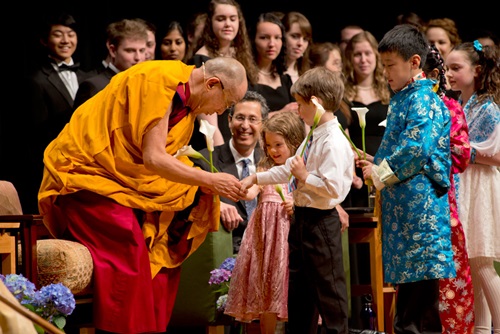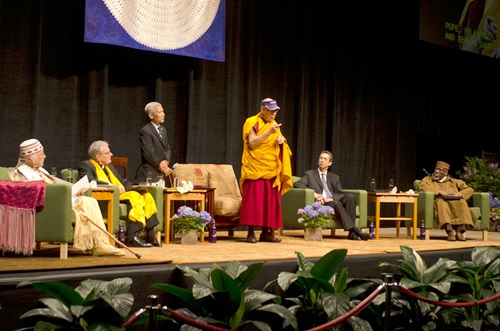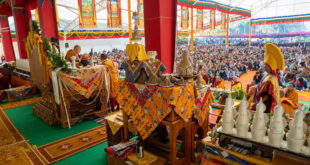Portland, Oregon, USA 9 May 2013
Starting his first full day in Portland, the ‘City of Roses’, His Holiness the Dalai Lama drove to the Chiles Center of the University of Portland where he was given a traditional Tibetan welcome by members of the 600 strong Tibetan community who live here. He was received by University of Portland President, Father Bill Beauchamp and Speaker of the Oregon House of Representatives, Tina Kotek. They escorted him to an interfaith gathering before an audience of 4300, the theme of which was ‘Spirituality and the Environment’. In her introduction, Speaker Kotek quoted His Holiness’s advice at the time of the Rio summit to “think of the one world to which we all belong.”
Invited to offer a few introductory words, His Holiness said:

“Spiritual brothers and sisters, brothers and sisters, I am very happy to be here for this, my first engagement on this visit to this beautiful city. Religious faith only exists among human beings; animals don’t have it. When people are facing difficulties beyond their control, their faith brings hope. When we are about to become angry and full of hatred, what restrains us is a sense of forgiveness. All the major religious traditions recognise this.
“Because we live in different kinds of environment and climatic conditions, we have developed different kinds of faith, but their goal is the same, to strengthen our basic sense of love and compassion. However, in order for that to be effective we need to take our religious practice seriously, not treating it just as some kind of ritual to be run through. For many of us, our faith only seems to appear when we are in the temple, church, synagogue or mosque. In our day to day life we give in to anger, hatred and so forth, destructive emotions that can lead to violence.”
He reiterated that while adopting religion is a matter of individual choice, if we do so, we should do so sincerely. He said that from time to time it is also important that religious leaders get together like this to show that in spirituality we share a message of peace. Because history is marked by incidents of conflict and bloodshed in the name of religion, it is important to work for and to demonstrate harmony among our spiritual traditions.
Regarding the natural environment, Father Bill quoted Genesis: “And he looked on everything he had created and saw that it was good.” This, he said, is an expression of the precious gift with which we have been entrusted. Grandmother Agnes Pilgrim recited a long prayer calling on Grandfather – God – to inspire us to care for the earth, the air and, most of all, the water, but also praying for the welfare of Tibetans.
His Holiness agreed that we have to take seriously that to some extent our behaviour affects the environment and consequently the climate. Therefore we have to take steps to protect this world, which is after all our only home. He mentioned small things that we can all do and which he does himself like turning off the lights when he leaves the room and showering instead of running a full bath. Father Bill concurred, saying that when he grew up no one gave any thought to taking care of the world; they just took it for granted. That way of thinking needs to change, indeed the younger generation today do think differently about it.
Imam Najieb recited a seven-fold prayer from the Quran in Arabic and English. Rabbi Cahana suggested that religious communities have a responsibility to inspire such a change of thought. He said that with regard to the environment one emotion unites us all: gratitude. Gratitude reminds us of the relationship between us and the environment. He quoted the Torah and God’s instructing Adam, “If you corrupt the world, there is no one to repair it after you.”
His Holiness was asked about his relationship to the environment in Tibet. He said that because of the small population the environment was pure and beautiful. In Tibet all the sources of water were clean and he was shocked to learn when he came to India that in many places water was too polluted to drink. This was a case of ignorance corrected by experience. He mentioned that the Tibetan plateau is so crucial to the water supply of about one billion people in Asia that one Chinese ecologist referred to Tibet as the Third Pole. He expressed the hope that those who recklessly exploit such resources in Tibet can also be educated to change. Grandmother Agnes commented that while laughter is the cheapest medicine, water is the best; we should be thankful for water.

Father Bill reminded everyone that the purpose of such an interfaith dialogue should not finish today, but should go on and be translated into action. Imam Najieb agreed that it should be a springboard from which to activate others. His Holiness was asked to offer a conclusion:
“We should never harm each other in the name of religion. Why not? Because like it or not we have to live together. The closer the contact we have with each other the greater our admiration and appreciation will be of the qualities of other religions, the source of solace for millions of people. At a conference years ago I met a physicist who told me how much he valued his field of study, but that he’d learned he couldn’t let himself become attached to it. I realised then that although I’m a Buddhist, I cannot afford to be attached to Buddhism, because that attachment creates bias and an inability to appreciate the goodness in others.
“The notion of one truth and one religion contradicts the reality of many truths and many religions. This is clarified when we see that as far as the individual is concerned it’s right to think of one truth and one faith, but as far as the wider human community is concerned we have to acknowledge the reality that there are many truths and many faiths. This is why I always advise: keep to your own religion, but learn from others.”
Participants in the interfaith meeting were invited to a luncheon at the President’s house, at the end of which His Holiness was again asked for his thoughts. He said:
“I’m very glad to have come to this city once more; this morning’s session, in the spirit of religious brotherhood, was very good. We need to repeat this in Africa, the Arab world and the Middle East. My brain enjoyed the meeting, my body enjoyed the lunch; thank you.”
Mayor of Portland, Charlie Hales, in his introduction to the afternoon session, pointed out that whereas other cities have parks within them, Portland, surrounded by mountains, forests and rivers, is a city within a park itself, and an ideal place to talk about the natural environment. However, wanting also to know how to work on the ways we treat one another, he requested His Holiness to speak.
“Dear brothers and sisters,” His Holiness began, “it’s a great honour to speak to you. Although I can see a great variety of faces and dress among you, I always stress the oneness of humanity.
“Most of the conflicts between us are our own creation, man-made problems. Well, some are women-made too, but violence tends to be more of a male problem. Our problems are linked to our dwelling on the secondary differences between us. We 7 billion human beings are the same mentally, emotionally and physically. We all want to live a happy life and avoid trouble; and we all have a right to do so. As social animals, our sense of community has a lot to do with this. Today, the global economy with its benefits and drawbacks goes far beyond national boundaries or religious divides. Problems like climate change affect us all.”
He mentioned that while the twentieth century was a period of unprecedented bloodshed, we should learn from it and make the twenty-first century an era of peace. It is not that there will no longer be any problems to resolve, but instead of force we should resort to dialogue in every instance. Peace can only be achieved through non-violence. This is something we have to train and educate our children to put into effect.
What is required is a sense of secular ethics, which is related to training and disciplining our minds and emotions. We need to develop a map of the mind. Just as we observe physical hygiene to keep ourselves healthy, we also need a sense of emotional hygiene to ensure the health of our minds.
His Holiness advised one questioner that change in the world comes from individuals, from the inner peace in individual hearts. Just as ripples spread out when a single pebble is dropped into water, the actions of individuals can have far-reaching effects. Another student asked how we can engage in dialogue with those who do not want to talk and His Holiness argued that if we seek reconciliation with patience and forgiveness other people will change. Regarding the natural environment, many people may still be uninformed and unaware of the issues involved. The solution is education.
Yangsi Rinpoche, founder of Maitripa College, the principal organiser of the day’s events, concluded the occasion with thanks to His Holiness for coming and with wishes for his long life.




